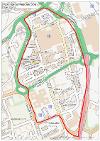Public spaces protection orders (PSPOs)
Current orders
Public Spaces Protection Order 1 of 2023 - Town Centre (PDF, 394 KB)(opens new window)

Public Spaces Protection Order 2 of 2023 - Borough wide (PDF, 401 KB)(opens new window)

About PSPOs
Public Spaces Protection Orders (PSPOs) are intended to deal with a nuisance or problem in a particular area that is detrimental to the local community's qualify of life. The PSPO imposes conditions (which apply to everyone) on the use of that area so that the majority of law-abiding people can use and enjoy our public spaces and be safe from antisocial behaviour.
PSPOs came into force on 20 October 2014 under section 59 to 65 of the Anti-Social Behaviour, Crime and Policing Act 2014, and replace Gating Orders, Dog Control Orders and Designated Public Place Orders.
Behaviours which can be controlled through restrictions or positive requirements within a PSPO can include:
- controlling access over public land
- consumption of alcohol
- dogs roaming freely and/or fouling
- storage of household items or waste
- storage of wheelie bins
- aggressive behaviours linked to begging, street peddling or preaching
The above list is not exhaustive and restrictions or positive requirements will be dependent upon the nature of the issue the PSPO is imposed to deal with.
Breaching a PSPO is an offence which can be dealt with through prosecution or by the issue of a Fixed Penalty Notice.
Who can make a PSPO
Councils are responsible for making the new PSPO, although enforcement powers will be much broader. Section 71 ensures that bodies other than local authorities can make PSPOs in certain circumstances by order of the Secretary of State.
Before making a Public Spaces Protection Order, the council must be satisfied on reasonable grounds that the activities carried out or likely to be carried out, in a public space:
- have had, or are likely to have, a detrimental effect on the quality of life of those in the locality
- are, or are likely to be, persistent or continuing in nature
- are, or are likely to be, unreasonable
- justify the restrictions imposed
Where a PSPO can apply
We can make a PSPO on any public space within our own area. The definition of public space is wide and includes any place to which the public or any section of the public has access, on payment or otherwise, as of right or by virtue of express or implied permission.
Working with partners
Before making a PSPO, we must consult with the local police force. This is done formally through the chief officer of police and the Police and Crime Commissioner, but details could be agreed by working-level leads. This is an opportunity for the police and council to share information about the area and the problems being caused, as well as discuss the practicalities of enforcement. In addition, the owner or occupier of the land should be consulted. This should include the County Council (if the PSPO application is not being led by them) if they are the highway authority.
We must also consult with community representatives we think appropriate. This could relate to a specific group, for instance a local residents' association, or an individual or group of individuals, for instance regular users of a park or specific activities such as busking or other types of street entertainment. Before the PSPO is made, the council has to make the order publicly available in accordance with regulations published by the Secretary of State.
Contact us
Safer Communities
Gateshead Council
Civic Centre
Regent Street
Gateshead
NE8 1HH
0191 433 3000 (during weekday normal office hours only, 8.30am to 5pm)
communitysafety@gateshead.gov.uk
